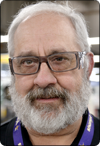
Growing up on St. Paul’s East Side, Mark Glocke would often catch up with his dad, a bus operator, and ride back to the old Snelling Garage with him at the end of his shift. “That’s probably where I got my first smell of bus exhaust,” he said. He also spent his high school years learning to take apart and repair engines. The experiences made a lasting impression: After going to school for heavy diesel mechanics, Glocke applied for a job in bus maintenance and within days was working as a cleaner at the very same garage his father had took him to as a boy. It was the first of many stops in a career that would eventually span more than four decades.
Glocke’s time as a cleaner was short-lived – he became a helper his first week and, within a year, was working as a technician. As a technician, he performed tune-ups, built engines and repaired what were known as “smokers,” buses that had engine leaks and were emitting large amounts of exhaust. After a brief venture in the trucking industry, Glocke returned in 1982 to serve as a supervisor at Nicollet Garage. It was a difficult job: Buses frequent broke down and he had to rally an unruly group of technicians to do whatever they could to get all the necessary buses out each day. He succeeded and was rewarded with more responsibility at the larger Snelling Garage, then home to nearly 300 buses.
Those experiences led to what would become the most significant role of his career, a 23-year run as body shop supervisor. Unlike his previous roles, the job wasn’t just about managing people. At the time, technicians were primarily responding to immediate needs and haphazardly repairing buses that could be set aside for a few days. Glocke helped implement a program that led every bus to be fully-refurbished halfway through its in-service life, usually after six or seven years on the street. Figuring out when and how to pull buses for these mid-life repairs was quite a task, but Glocke was committed to making it work. The motivation to do well came in part from his time in the trucking industry. “We’d see buses with their panels flapping and just laugh, joking that they were about to take off into flight,” he said. Metro Transit would soon become known for having one of the best-looking and top performing fleets in the nation. The body shop also developed a reputation for bringing buses back to life after major collisions. Glocke can only think of a handful of buses that were deemed beyond repair during his tenure. The success reflects the strong sense of ownership and accountability Glocke promoted among technicians in the body shop. “People knew if we didn’t do a good job, we’d have to redo it,” he said.
Even so, the shop was a laboratory where new and tenuous ideas could be tested without fear of failure. The body shop frequently received requests to build custom tools that could be used on the shop floor or in other parts of the business. One of the most unique challenges the body shop received was to adorn a bus with lights for the holidays – what would become known as the beloved “Twinkle Bus.” “We had a lot of side jobs where we’d just have to get everybody together and say, ‘What can we do here?’” Glocke said. “It was fast, it was fun and there were always lots of challenges.”
In the final year of his career, Glocke was tapped to serve as the acting assistant manager of the Overhaul Base, where he helped oversee operations and advised his successor in the body shop. In retirement, he plans to enjoy his family, including three children and six grandchildren, finish some house projects, and spend more time hunting, fishing and enjoying the outdoors. He also hoped to do more traveling, including some long-distance train trips, and to stay involved in the Ham Lake Lions Club.